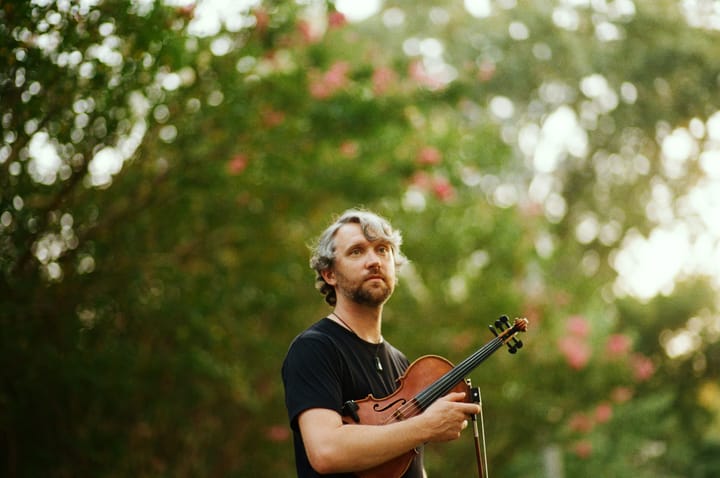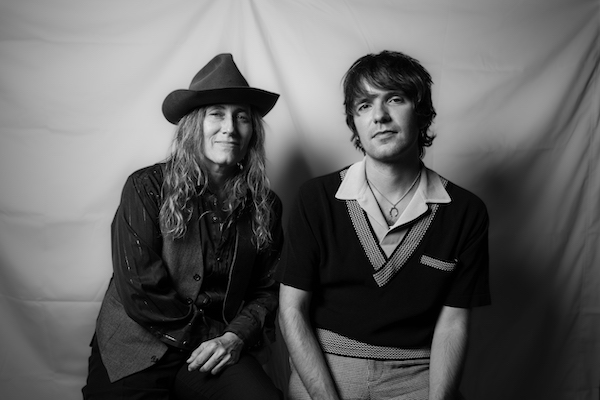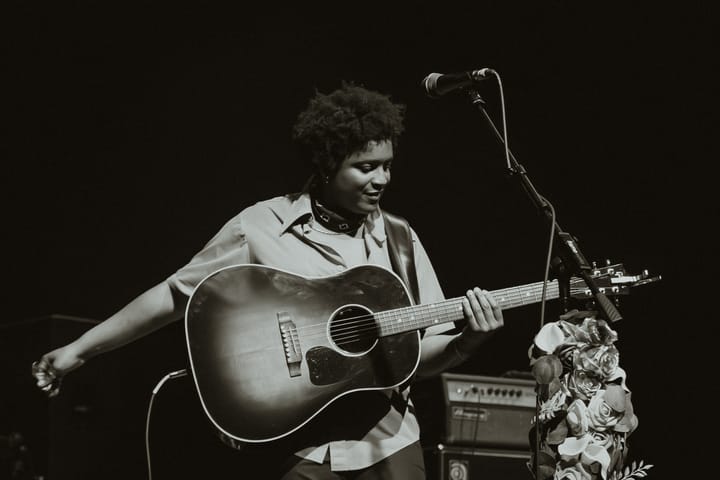Fats Kaplin can play just about anything with strings, and a lot of things without. He is renowned for his skill on fiddle, accordion, pedal steel, guitar, dobro, mandolin, and frying pan; in addition to being a world-class musician, Fats (he was once a skinny kid named Karl) is a formidable chef.
It all ties together with his insatiable desire to learn more about the many things that interest him, whether he is studying the Oud with a Turkish master musician in Istanbul or brushing up on sauces in rural Tuscany.
Kaplin's professional career began at 17 when he went on tour with acoustic bluesman Roy Book Binder. He has gone on to play with Tom Russell, the Tractors, Pure Prairie League and others. His work in a trio with Kieran Kane and Kevin Welch has resulted in two albums. When he's not on the road supporting others, Kaplin does session work in Nashville.
NO DEPRESSION: How did you get started playing music?
FATS KAPLIN: I grew up in New York City in a family of artists. When I was about 10 or 11, it was the mid-'60s, right in the middle of the folk boom. We spent a lot of time in Washington Square Park. I'd see banjo players, and people singing. I had an uncle, Uncle Tom. He was very, very influential to me. He was my mother's brother.
Tom played banjo and so I wanted to play banjo too. So I got a little banjo and I got the red Pete Seeger book. I played around with it for a year or two and would play some folk songs and things like that. Pete Seeger had a show on PBS back in the '60s called Rainbow Quest. He would play and then have special guests like Elizabeth Cotten and the like. I would always watch it just to see him play banjo.
A lot of people would see a rock band and say, "When I saw the Beatles, or when I saw AC/DC, I flipped out and I just wanted to play electric guitar." For me, it was the New Lost City Ramblers on Rainbow Quest doing the fiddle/guitar/banjo thing. I just thought that was the hippest thing I had ever seen, the greatest thing I had ever heard, this string band music, and suddenly I wanted to play fiddle.
Living in New York City, I'd go down to Lincoln Center and I realized that there were all these reissues on County Records, all those New Lost City Ramblers records. From there I went into the Jim Kweskin Jug Band, Dave Van Ronk, and from there into early blues. I was just astounded that there was this much different stuff available. I then realized there were these folk festivals, so I started going out to listen to other people play.
ND: How did you become a professional musician?
FK: I went to a few folk festivals and met some other teenagers who were playing. We got a little band together and were playing some folk-type music. We were playing at a small festival in New Jersey that Roy Book Binder was playing at. I went over and listened to him. Afterwards they had some party and I was there and I was playing and he walked by, and we played a tune or something.
At that point I didn't know that much about that kind of early East Coast blues style. We started working together and I began really immersing myself in the Mississippi Sheiks, Bo Carter, Lonnie Johnson, Big Bill Broonzy, that kind of stuff.
ND: One of your first gigs with Book Binder was opening for Sonny Terry & Brownie McGhee at Max's Kansas City...
FT: And we got a review in The New York Times that I think I still have down in my basement.
ND: That had to be pretty heady stuff for a 17-year-old.
FK: It was, and playing with Pink Anderson, going down to Spartanburg, South Carolina, and getting him. I had never been down south before in my life.
ND: What happened after you left Book Binder?
FK: I left Book Binder when I was 20 or so. I got really interested in early jazz. I started playing Joe Venuti-esque stuff, or trying to, and realized that I needed a lot more chops. I started studying more seriously, and playing a little jazz. I ended up in Las Vegas at the age of 21. I went out there for music and ended up becoming a craps dealer at the Four Queens, which was the only other job I've ever had in my life other than playing music.
I was out there for two years before returning to New York. Back in New York I kind of hacked around doing a few different things and finally wound up getting a call from Tom Russell.
ND: He called wanting you to join his band?
FK: They needed a fiddle player to play a gig in New York City. He was playing a lot of country cover-type stuff that was very big at that point. He called me up, I went down and played, just fiddle, and stayed with him for seven-plus years.
ND: So it was a pickup gig that lasted seven years?
FK: It was. We had a lot of simpatico stuff. At that time I was getting kind of immersed in playing conjunto accordion and he was really into Tex-Mex music. I was also playing a lot of steel guitar at that point.
ND: Where did you go after Tom Russell?
FK: I had met Kevin Welch at a festival in Switzerland. He called me up when he was playing in New York with Jimmie Dale Gilmore, so I came by and sat in with both bands. Oddly enough, the week that the Tom Russell Band disbanded, Kevin called me up out of the blue, and said, "Have you ever thought about moving to Nashville? I'm trying to put together a band." And it was like a bolt from the blue for me because I was really trying to get out of New York City. A couple of months later I moved and I fell right in and did well. It's been good working here.
ND: And you've worked steadily with a variety of people.
FK: I recorded with the Scorchers on Clear Impetuous Morning and I've worked with Jason [Ringenberg] on most all of his records as well, including the Farmer Jason projects, as has my wife Kristi Rose. I also got called to go work with the Tractors and there was a big huge tour.
ND: You and Kristi have been married for quite awhile, haven't you?
FK: We've been married for twelve years. I knew Kristi Rose when she had the band the Midnight Walkers and was very big in New York City. We were kind of in that same circuit, and we were both on Rounder Records. I was playing with the Mavericks at the Bluebird in Nashville and Kristi came, and I recognized her and she kind of recognized me. I ended up doing a couple of shows with her, and we got to talking and this and that and being expatriate New Yorkers. The next thing you know we've been married for 12 years, and have worked and put out some records. We have a new one that's coming out in a couple of months.
ND: You are most known for being a multi-instrumentalist. What do you consider to be your main instrument?
FK: I don't really have one; I prefer to be thought of as a musician instead being defined by an instrument. For example, there are steel guitar players who are defined by their instrument. They are specialists. I never sought out to become a specialist. I never sought out to become a multi-instrumentalist either, meaning I never picked up an instrument thinking that this would be a good double.
Any instrument I play, I play because I became interested in it. Button accordion was very much that way. I never had any idea that one day I would be recording with it. I just wanted to play some early Tex-Mex music.
I'm very comfortable on fiddle since it is the one I have played the longest. With Kane, Welch, & Kaplin, I end up playing a fair amount of electric guitar, kind of in a Pops Staples type of style. Pops is probably one of my main influences. The sound of his is just the coolest sound. I don't know if there is anything better than that. There might be something different, but not better. He had very cool tone.
ND: Any instrument endorsements?
FK: No. I have an Elixir string endorsement. My instruments are so divergent that I've never really had one. I play the oud and the baglama from Turkey -- not a lot of endorsement deals available there. I play an Emmons steel guitar, but I've played other steel guitars. My Emmons was made for me back in 1980. I have two German fiddles, one made in 1923 and the other in 1926. Right now I am playing a Phoenix mandolin made by Rolfe Gerhardt, a very interesting make, a double cutaway much like what Jethro Burns used to play. It's a great instrument.
As far as guitars go, I have kind of a goofy assortment; Kays, a couple of Martins. On the road with Kane, Welch, & Kaplin I wind up playing a small Kay parlor guitar with an old Bill Lawrence pickup. Joe Glaser and I worked out a way to kind of hang it from the sound hole and it's a very quirky instrument. It's the cheapest little parlor Kay that they ever made; it's a plywood guitar, kind of a piece of junk really, with a really nice neck and a good pickup. It plays really well and has a funky sound, a lot like a resonator guitar. I have a Martin D-18V that I will use running through various things.
ND: What do you get the most call for as far as session work goes?
FK: Occasionally I'll get called in to do button accordion stuff; somebody is doing a record for a major label and they want some Tex-Mex accordion on one song. I've done that a few times. Mostly I get called in to do fiddle and steel and mandolin, and maybe dobro or something else, just to be a general utility player. It's worked out pretty well. If one thing doesn't get me work, something else does.
ND: What about the cooking? I keep hearing references to your cooking.
FK: I really love to cook. I kind of studied on my own, Italian cooking. Last night I went down to North Alabama where Kristi Rose's brother and family lives, and for his birthday I made a rustic pasta with a gorgonzola sauce.
I've cooked since I was a kid; I've always really liked to cook. I cooked quite a bit of Chinese stuff growing up. My mother taught art in junior high school in Chinatown for 25 years, so we were around Chinatown quite a bit, around the real Chinese; also around the real Italian cooking.
I've been to Italy a whole bunch and would study regional cooking, using local styles and ingredients. I always say that I would have loved to have been a chef...but that's because I never was one. I hear people say, "I wish I was a professional musician or a songwriter." That's because you are not one. It's not as fun when it's your job.
ND: What is your preferred music? What is it that just grabs you and won't let go? Is it still the string band stuff of your youth?
FK: I have to say I really love, and have always loved the early string band and earlier blues more than anything else. I love those early recordings of Monroe, Flatt & Scruggs, and the Stanley Brothers; that stuff is just fantastic. But I think somewhere along the way bluegrass became too structured. It became, "This is what it is, these are the instruments you have to use, this is how you have to play it." It's very tightly structured, and that's one of the things that draws some people to it, where with the early string bands and jug bands, there wasn't any "right way" to do things.
ND: How would you describe your musical style? Do you have a musical philosophy?
FK: A while back, Kristi Rose and I were driving through Memphis on our way to Tulsa, Oklahoma, to go hang out and record with Steve Ripley. We found this great Memphis station that was playing regional dance hits. It was so cool. Some of them weren't very good. They might have been poorly recorded, or something similar, but they were all hits in the local areas. Kristi looks at me and says, "It's all groove and vibe."
That's all it is. It's just a vibe and a groove; everything else is secondary. That's the answer to everything: groove and vibe.




Comments ()